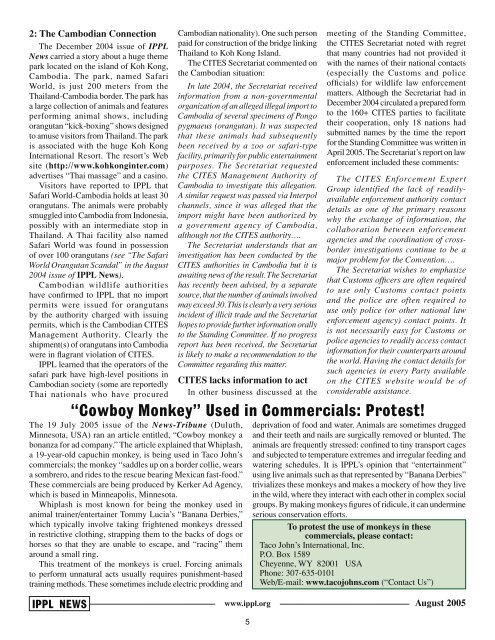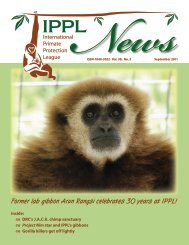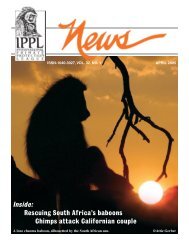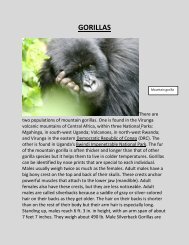IPPL News Aug05.indd - International Primate Protection League
IPPL News Aug05.indd - International Primate Protection League
IPPL News Aug05.indd - International Primate Protection League
Create successful ePaper yourself
Turn your PDF publications into a flip-book with our unique Google optimized e-Paper software.
2: The Cambodian Connection<br />
The December 2004 issue of <strong>IPPL</strong><br />
<strong>News</strong> carried a story about a huge theme<br />
park located on the island of Koh Kong,<br />
Cambodia. The park, named Safari<br />
World, is just 200 meters from the<br />
Thailand-Cambodia border. The park has<br />
a large collection of animals and features<br />
performing animal shows, including<br />
orangutan “kick-boxing” shows designed<br />
to amuse visitors from Thailand. The park<br />
is associated with the huge Koh Kong<br />
<strong>International</strong> Resort. The resort’s Web<br />
site (http://www.kohkonginter.com)<br />
advertises “Thai massage” and a casino.<br />
Visitors have reported to <strong>IPPL</strong> that<br />
Safari World-Cambodia holds at least 30<br />
orangutans. The animals were probably<br />
smuggled into Cambodia from Indonesia,<br />
possibly with an intermediate stop in<br />
Thailand. A Thai facility also named<br />
Safari World was found in possession<br />
of over 100 orangutans (see “The Safari<br />
World Orangutan Scandal” in the August<br />
2004 issue of <strong>IPPL</strong> <strong>News</strong>).<br />
Cambodian wildlife authorities<br />
have confirmed to <strong>IPPL</strong> that no import<br />
permits were issued for orangutans<br />
by the authority charged with issuing<br />
permits, which is the Cambodian CITES<br />
Management Authority. Clearly the<br />
shipment(s) of orangutans into Cambodia<br />
were in flagrant violation of CITES.<br />
<strong>IPPL</strong> learned that the operators of the<br />
safari park have high-level positions in<br />
Cambodian society (some are reportedly<br />
Thai nationals who have procured<br />
The 19 July 2005 issue of the <strong>News</strong>-Tribune (Duluth,<br />
Minnesota, USA) ran an article entitled, “Cowboy monkey a<br />
bonanza for ad company.” The article explained that Whiplash,<br />
a 19-year-old capuchin monkey, is being used in Taco John’s<br />
commercials; the monkey “saddles up on a border collie, wears<br />
a sombrero, and rides to the rescue bearing Mexican fast-food.”<br />
These commercials are being produced by Kerker Ad Agency,<br />
which is based in Minneapolis, Minnesota.<br />
Whiplash is most known for being the monkey used in<br />
animal trainer/entertainer Tommy Lucia’s “Banana Derbies,”<br />
which typically involve taking frightened monkeys dressed<br />
in restrictive clothing, strapping them to the backs of dogs or<br />
horses so that they are unable to escape, and “racing” them<br />
around a small ring.<br />
This treatment of the monkeys is cruel. Forcing animals<br />
to perform unnatural acts usually requires punishment-based<br />
training methods. These sometimes include electric prodding and<br />
Cambodian nationality). One such person<br />
paid for construction of the bridge linking<br />
Thailand to Koh Kong Island.<br />
The CITES Secretariat commented on<br />
the Cambodian situation:<br />
In late 2004, the Secretariat received<br />
information from a non-governmental<br />
organization of an alleged illegal import to<br />
Cambodia of several specimens of Pongo<br />
pygmaeus (orangutan). It was suspected<br />
that these animals had subsequently<br />
been received by a zoo or safari-type<br />
facility, primarily for public entertainment<br />
purposes. The Secretariat requested<br />
the CITES Management Authority of<br />
Cambodia to investigate this allegation.<br />
A similar request was passed via Interpol<br />
channels, since it was alleged that the<br />
import might have been authorized by<br />
a government agency of Cambodia,<br />
although not the CITES authority….<br />
The Secretariat understands that an<br />
investigation has been conducted by the<br />
CITES authorities in Cambodia but it is<br />
awaiting news of the result. The Secretariat<br />
has recently been advised, by a separate<br />
source, that the number of animals involved<br />
may exceed 30. This is clearly a very serious<br />
incident of illicit trade and the Secretariat<br />
hopes to provide further information orally<br />
to the Standing Committee. If no progress<br />
report has been received, the Secretariat<br />
is likely to make a recommendation to the<br />
Committee regarding this matter.<br />
CITES lacks information to act<br />
In other business discussed at the<br />
——————————————————————— <strong>IPPL</strong> NEWS<br />
www.ippl.org ———————————————— August 2005<br />
5<br />
meeting of the Standing Committee,<br />
the CITES Secretariat noted with regret<br />
that many countries had not provided it<br />
with the names of their national contacts<br />
(especially the Customs and police<br />
officials) for wildlife law enforcement<br />
matters. Although the Secretariat had in<br />
December 2004 circulated a prepared form<br />
to the 160+ CITES parties to facilitate<br />
their cooperation, only 18 nations had<br />
submitted names by the time the report<br />
for the Standing Committee was written in<br />
April 2005. The Secretariat’s report on law<br />
enforcement included these comments:<br />
The CITES Enforcement Expert<br />
Group identified the lack of readilyavailable<br />
enforcement authority contact<br />
details as one of the primary reasons<br />
why the exchange of information, the<br />
collaboration between enforcement<br />
agencies and the coordination of crossborder<br />
investigations continue to be a<br />
major problem for the Convention….<br />
The Secretariat wishes to emphasize<br />
that Customs officers are often required<br />
to use only Customs contact points<br />
and the police are often required to<br />
use only police (or other national law<br />
enforcement agency) contact points. It<br />
is not necessarily easy for Customs or<br />
police agencies to readily access contact<br />
information for their counterparts around<br />
the world. Having the contact details for<br />
such agencies in every Party available<br />
on the CITES website would be of<br />
considerable assistance.<br />
“Cowboy Monkey” Used in Commercials: Protest!<br />
deprivation of food and water. Animals are sometimes drugged<br />
and their teeth and nails are surgically removed or blunted. The<br />
animals are frequently stressed: confined to tiny transport cages<br />
and subjected to temperature extremes and irregular feeding and<br />
watering schedules. It is <strong>IPPL</strong>’s opinion that “entertainment”<br />
using live animals such as that represented by “Banana Derbies”<br />
trivializes these monkeys and makes a mockery of how they live<br />
in the wild, where they interact with each other in complex social<br />
groups. By making monkeys figures of ridicule, it can undermine<br />
serious conservation efforts.<br />
To protest the use of monkeys in these<br />
commercials, please contact:<br />
Taco John’s <strong>International</strong>, Inc.<br />
P.O. Box 1589<br />
Cheyenne, WY 82001 USA<br />
Phone: 307-635-0101<br />
Web/E-mail: www.tacojohns.com (“Contact Us”)










